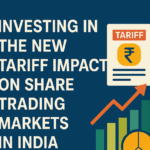The Securities and Exchange Board of India (SEBI) has long been instrumental in regulating and developing the Indian securities market. In 2025, SEBI introduced a series of impactful regulatory changes aimed at increasing transparency, protecting retail investors, and strengthening corporate governance.
This article offers a detailed analysis of SEBI’s key regulatory reforms in 2025, their rationale, and how they affect retail investors across IPOs, mutual funds, stock trading, and the broader financial ecosystem.
🏛️ Overview of SEBI’s Role in India
Before diving into the 2025 updates, here’s a quick recap of SEBI’s core functions:
- Regulates securities markets
- Protects investor interests
- Promotes fair trading practices
- Supervises intermediaries like brokers, mutual funds, rating agencies
Official website: SEBI.gov.in
🔧 Major SEBI Regulations Introduced in 2025
Let’s look at the key regulatory announcements by SEBI this year and how they reshape India’s capital markets.
1. Mandatory T+0 Settlement for Select Stocks
Effective Date: Pilot from June 2025
Applicable To: Top 50 Nifty stocks (initial phase)
What Changed:
SEBI has introduced T+0 settlement (same-day trade and settlement) for select highly liquid stocks, replacing the current T+1 cycle.
Impact on Retail Investors:
- Quicker access to funds or shares
- More liquidity for traders
- Lower counterparty risk
Challenges:
- Brokers and banks need tech upgrades
- Settlement risk needs active monitoring
Expert Insight:
Retail traders with intraday strategies will benefit significantly. However, same-day settlement may bring volatility if not implemented carefully.
2. Regulations on Financial Influencers (‘Finfluencers’)
Effective Date: April 2025
What Changed:
SEBI has barred SEBI-registered intermediaries (brokers, advisors) from associating with unregistered financial influencers.
Key Rules:
- Finfluencers must disclose affiliations
- Penalty for misrepresentation of returns
- SEBI to maintain a whitelist of registered content creators
Impact on Retail Investors:
- More reliable content
- Reduced risk of misleading advice
- Push for transparent financial education
Expert Opinion:
This is a landmark move that protects retail investors from hype-driven, affiliate-fueled misinformation on platforms like YouTube and Instagram.
3. IPO Allotment Transparency Norms Tightened
Effective Date: April 2025
What Changed:
SEBI now mandates full public disclosure of anchor investor bids, HNI subscription, and fund source verification.
New Norms:
- Anchor lock-in period raised from 30 to 60 days
- Greater scrutiny of QIBs & HNIs
- Retail application refund timelines shortened
Impact on Retail Investors:
- Better visibility into IPO demand
- Less manipulation of GMP & grey market
- More time for informed decision-making
Expert View:
This curbs pump-and-dump schemes and speculative frenzy seen in IPOs. Long overdue and good for genuine investors.
4. Mutual Fund Risk-O-Meter Disclosure Revamp
Effective Date: May 2025
What Changed:
SEBI revamped its Risk-o-Meter for mutual funds. Now, risk levels must be updated weekly instead of monthly.
Also Introduced:
- Portfolio concentration disclosure
- Beta and volatility metrics in fact sheets
- Standardized return buckets (1, 3, 5 years)
Impact on Retail Investors:
- Easier to compare funds
- Real-time risk tracking
- More transparency in debt fund holdings
Expert Insight:
The move brings mutual fund disclosures closer to international standards. SIP investors gain clearer understanding of risks.
5. New ESG Reporting Framework (BRSR Core)
Effective Date: April 2025
Applies To: Top 250 listed companies
What Changed:
SEBI has mandated Business Responsibility and Sustainability Reporting (BRSR Core), focused on climate impact, energy use, diversity metrics, and board conduct.
Impact on Retail Investors:
- Greater insight into ESG factors
- Helps investors align with ethical investing goals
- Enables better long-term capital allocation
Expert View:
With ESG-based investing growing in India, this boosts investor trust in listed companies claiming to be “sustainable.”
6. ASBA UPI Limits Revised for IPOs
Effective Date: April 2025
What Changed:
SEBI has increased the UPI limit for IPO applications from ₹5 lakh to ₹10 lakh, enabling HNIs to use UPI more freely.
Impact:
- Retail investors applying in HNI category benefit
- More UPI-based applications expected
- Faster blocking/unblocking of funds
Note: This helps bridge participation gaps between retail and high-net-worth individuals.
7. Increased Penalty for Insider Trading & Front Running
Effective Date: May 2025
What Changed:
SEBI now imposes higher monetary penalties and blacklisting for 5 years on individuals caught front-running or insider trading.
Impact on Retail Investors:
- Greater market fairness
- Cleaner institutional participation
- More trust in listed equities
Recent Case:
In April 2025, SEBI fined a portfolio manager ₹7 crore for front-running during a block deal – the largest such fine in a year.
💼 How These Reforms Affect Retail Investor Behavior
| Reform | Effect on Retail Investors |
|---|---|
| T+0 Settlement | Improved liquidity and faster turnaround |
| Finfluencer Guidelines | Reduced misinformation and higher trust |
| IPO Norms | Fairer allotment process and better disclosures |
| MF Risk Meter | Real-time portfolio risk understanding |
| ESG Reporting | More ethical, informed investing choices |
| UPI Limit Raised | Higher flexibility for IPO investments |
| Insider Trading Crackdown | Improved market integrity |
These reforms reflect SEBI’s strategic shift toward:
- Digital integration
- Retail protection
- Faster settlements
- Sustainable investing
📢 Industry Reaction
Nithin Kamath (Zerodha CEO):
“T+0 is a big leap. While infrastructure upgrades are necessary, it signals how forward-looking SEBI has become.”
Dhirendra Kumar (Value Research):
“Mutual fund investors often underestimate risk. Real-time updates to Risk-o-Meter are a much-needed step.”
Harsh Jain (Groww Co-Founder):
“Banning unregulated finfluencers protects new investors from potentially irreversible financial mistakes.”
🌍 How India’s Reforms Compare Globally
| Country | Settlement Cycle | Finfluencer Regulation | ESG Mandate |
|---|---|---|---|
| India | T+1 (T+0 pilot) | Strict bans on misuse | BRSR Core |
| US | T+1 by May 2024 | No formal framework | Voluntary |
| UK | T+2 | FCA regulates advice | Mandatory for FTSE350 |
| Singapore | T+2 | MAS governs all advisories | ESG semi-mandatory |
India is leading in digitized settlement speed and retail investor safety, though ESG norms are still evolving in comparability.
📚 How Retail Investors Can Stay Updated
- Visit SEBI.gov.in – Check circulars, press releases, and FAQs regularly
- Follow NSE India Notices – For IPO & settlement updates
- Use Trusted Platforms – Zerodha Varsity, Moneycontrol, Financyte
- Avoid Unverified Advice – Only follow registered analysts or advisors
- Subscribe to SEBI Investor Bulletins – Monthly email newsletters
✅ Conclusion
SEBI’s regulatory interventions in 2025 are a bold step toward modernizing India’s capital markets, especially for retail investors. From same-day settlement to curbing online misinformation and making IPOs fairer, these changes promise a healthier, safer, and more transparent investment environment.
For the informed investor, this is a time to:
- Embrace technology
- Prioritize risk management
- Look beyond hype
- Invest based on fundamentals and verified research






